Egypt
Mysterious Treasures of Antiquity and Mideastern Culture
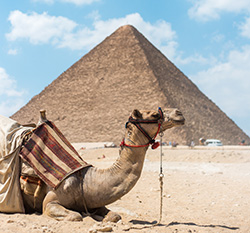
Photo by Rosario Janza / Unsplash | For history aficionados, Egypt beckons with ancient wonders, exotic mideastern allure and modern vibrancy. Gaze in awe at the majestic Pyramids of Giza, a testament to human ingenuity and architectural brilliance. The Sphinx guards the pyramids with its enigmatic gaze, inviting contemplation on the mysteries of the past. Delve deeper into Egypt's history with a visit to the Egyptian Museum, home to an impressive collection of artifacts and treasures. |
|
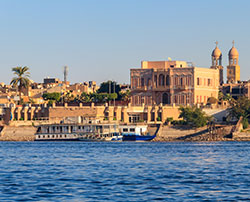
Photo by Olyasolodenko / Adobe | Embark on a multi-day day cruise along the Nile river to experience some of the ancient wonders of the Egypt. Or just enjoy a leisurely walk along the Nile River, relishing the sunset views while savoring traditional Egyptian delicacies. Cairo's charm lies in its harmonious blend of antiquity and modernity, offering an enchanting journey through time and culture.
|
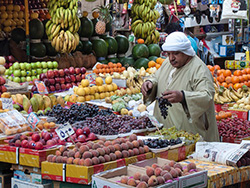
Photo by Bernd / Pixabay | Immerse yourself in the vibrant chaos of Cairo's markets, and witness the stunning beauty of the Red Sea in Sharm El Sheikh or Hurghada. |
Museums
The Egyptian Museum
Located in Cairo, the Egyptian Museum is the world's largest repository of Egyptian antiquities, with a staggering 120,000 artifacts. The highlights include the iconic golden mask and treasures of Tutankhamun, the Rosetta Stone that unlocked hieroglyphics, a wealth of mummies, colossal statues of pharaohs and gods, model boats reflecting Nile life, exquisite ancient jewelry, the Amarna Room shedding light on Akhenaten's reign, and a remarkable glimpse into everyday ancient Egyptian life with tools and pottery. This museum is a mesmerizing time capsule encapsulating over 5,000 years of Egypt's rich history and culture.
Museum of Islamic Art
Also in Cairo, the Museum of Islamic Art boasts a sprawling collection of Islamic art, spanning from the 7th to the 19th centuries, and its most significant treasures include breathtaking textiles, intricate ceramics, masterful metalwork, and exquisite glassware, all representing the diverse artistic heritage of the Islamic world. This cultural gem in the heart of its namesake, Doha, offers a captivating journey through centuries of artistic expression and craftsmanship.
Grand Egyptian Museum, Giza
The upcoming Grand Egyptian Museum near the Giza Pyramids promises a modern showcase for treasures.
Luxor Museum
The Luxor Museum offers a focused insight into Luxor and Karnak's history, while the Nubian Museum in Aswan highlights Nubia's rich heritage.
Nubian Museum
The Nubian Museum in Aswan highlights Nubia's rich heritage.
Alexandria National Museum
The Alexandria National Museum delves into the city's legend-laden history, and the Greco-Roman Museum in Alexandria explores Hellenistic and Roman influences, ensuring an enriching experience for retirees seeking to uncover Egypt's multifaceted legacy.
Best time to Visit Egypt:
Please note that these temperature ranges are approximate and can vary depending on the specific location within Egypt. Additionally, the temperatures in Egypt's desert regions, like the Western Desert and Sinai Desert, can often be more extreme, with higher daytime temperatures and cooler nights.
Spring (March to May):
Spring is generally a pleasant time to visit Egypt, as the temperatures are milder compared to the scorching heat of the summer months. It's a great season for exploring historical sites, taking Nile cruises, and enjoying outdoor activities. The weather is warm and comfortable, making it an ideal time to explore the country.
- March: 55°F - 84°F (13°C - 29°C)
- April: 61°F - 84°F (16°C - 29°C)
- May: 67°F - 93°F (19°C - 34°C)
Summer (June to August):
During the summer months, Egypt experiences a hot and dry climate, particularly in areas like Cairo and Luxor. The summer in Egypt can be quite intense, with high temperatures and low humidity.
- June: 77°F - 102°F (25°C - 38°C)
- July: 79°F - 102°F (26°C - 39°C)
- August: 79°F - 102°F (26°C - 39°C)
Fall (September to November):
Autumn in Egypt is quite comfortable, with temperatures becoming more moderate. It's a relief from the intense heat of summer, making it a good time for sightseeing at the Pyramids of Giza, the temples of Luxor, and the Valley of the Kings as well as and other outdoor activities. The weather is comfortable for cruising along the Nile and visiting various cities and archaeological sites along the way.
- September: 75°F - 97°F (24°C - 36°C)
- October: 67°F - 88°F (19°C - 31°C)
- November: 59°F - 79°F (15°C - 26°C)
Winter (December to February):
Winter in Egypt is also a pleasant time to visit, especially if you prefer cooler temperatures. While coastal areas remain relatively mild, the interior and desert regions can experience cooler temperatures, especially in the evenings. Coastal areas like Alexandria and Sharm El Sheikh remain relatively pleasant. A Nile cruise to Luxor and Aswan are also pleasant during this time.
- December: 54°F - 73°F (12°C - 23°C)
- January: 50°F - 69°F (10°C - 21°C)
- February: 53°F - 72°F (12°C - 22°C)
|
Travel Tips:
- Use Right Hand for Eating: In Middle Eastern culture, the left hand is considered unclean, so always use your right hand for eating and handling food. Similarly, avoid pointing or gesturing with the left hand.
- Regional Culture: Embrace the warmth and hospitality of the local people, experience traditional music and dance, and savor the flavors of Middle Eastern cuisine.
Egypt Transportation:
- Air Travel: Domestic flights are crucial for covering longer distances within the country. Reputable airlines like EgyptAir operate frequent flights connecting major cities and tourist hubs. With a reliable and efficient network, domestic flights offer a comfortable travel option for traversing Egypt's vast landscapes swiftly.
- Trains: Egypt's railway system provides a practical means of travel. The country has been enhancing its train services, with initiatives like the Cairo Metro and the high-speed train connecting cities. These systems offer convenience for navigating urban centers and are part of efforts to improve regional connectivity.
- Buses: Buses are a popular and budget-friendly mode of travel in Egypt, catering to major cities and tourist destinations with mostly air-conditioned and comfortable options. To ensure a safe journey, opt for reputable bus companies like GoBus Egypt and SuperJet, book tickets ahead during peak times, stay vigilant, keep belongings close, and avoid storing valuables in luggage compartments. Expect occasional delays as Egyptian buses may not adhere strictly to schedules.
- Ferries and Boats:The Nile River and Egypt's coastline foster the use of ferries for transportation. Operating between ports, ferries offer not only transit but also scenic experiences, connecting coastal regions and islands. Ferries are significant for iconic destinations like Cairo and Luxor.
- Taxis:Taxis are readily available within cities and towns, serving as a convenient urban transportation mode. It's advisable to ensure meter usage or agree on fares beforehand. Taxis are efficient for short trips or when public options are limited. Caution is advised against unregulated taxis.
Car Rentals: Renting a car provides flexibility for independent travelers. International car rental companies operate in Egypt, catering to various preferences and budgets. Awareness of local driving regulations and road safety is crucial due to varying traffic conditions. Road signs are often in Arabic, which can be a challenge for those who do not read the language. Additionally, communication with locals might be difficult if you don't speak Arabic. GPS and mobile apps can be helpful for navigation, but data coverage can be inconsistent in some remote regions. In some areas, there may be security concerns, and travelers should stay updated on current safety conditions and government advisories.
Safety Tips:
- Research and Stay Informed: Before your trip, thoroughly research your destination and check the latest travel advisories from your government. Stay updated on any potential risks or safety concerns.
- Stay in Designated Tourist Areas: Choose accommodations in safe and well-known tourist areas. Be aware of your surroundings and avoid isolated or remote regions that may have security risks. Avoid walking alone at night, be careful about what you wear, and do not carry large sums of cash.
- Register with Your Embassy: Register your travel plans with your country's embassy or consulate in the Middle East. This allows them to contact you in case of emergencies or provide important updates. Follow any security advisories or travel warnings issued by your home country's embassy or consulate.
- Travel Advisories Stay updated on current events, local regulations, and any travel advisories when traveling abroad. Visit the US Government State Department Travel Advisories web site to check on the status of your destination.
- Enroll in the STEP Program: Travelers are also urged to enroll in the U.S. State Department's Smart Traveler Enrollment Program (STEP) to receive security messages and to make it easier to locate them in an emergency. The Department uses these security messages to convey information about terrorist threats, security incidents, planned demonstrations, natural disasters, etc. In an emergency, please contact the nearest U.S. Embassy or consulate or call the following numbers: 1 (888) 407-4747 (toll-free in the United States and Canada) or 1 (202) 501-4444 from other countries.
- Respect Local Customs and Culture: Familiarize yourself with the local customs and cultural norms. Dress modestly in conservative areas, and be mindful of local traditions, especially during religious events. Avoid discussing sensitive political or religious topics. Non-Muslims may not be allowed to enter some mosques or certain areas within them. Always ask for permission and follow any rules or guidelines when visiting religious sites.
- Photography Restrictions: Always ask for permission before taking photos of individuals, especially women and religious figures. In some places, photography might be restricted, especially near military or government buildings.
- Use Right Hand for Eating: In Middle Eastern culture, the left hand is considered unclean, so always use your right hand for eating and handling food. Similarly, avoid pointing or gesturing with the left hand.
- Avoid Alcohol Consumption in Public: Some Middle Eastern countries have strict alcohol laws, and public consumption of alcohol may be prohibited. If you wish to drink alcohol, do so in designated areas like hotels or licensed restaurants.
- Avoid Public Demonstrations: Stay away from political gatherings, protests, or demonstrations, as they can sometimes become unpredictable and potentially unsafe.
- Be Cautious with Personal Belongings: Keep your valuables secure and be vigilant in crowded places. Use a money belt or a secure bag to carry essential documents and money.
- Use Reliable Transportation: Opt for reputable transportation services and licensed drivers. Avoid unmarked taxis or unregulated transport options.
- Stay Hydrated and Use Sun Protection: The Middle East can have hot weather, so stay hydrated and use sunscreen, hats, and sunglasses to protect yourself from the sun.
- Drink Bottled Water: Stick to bottled water for drinking and brushing your teeth to avoid potential waterborne illnesses.
- Be Mindful of Food Safety: Enjoy local cuisine, but choose reputable eateries and avoid street food if you have concerns about its preparation and handling.
- Carry Important Contact Information: Have local emergency numbers and contacts readily available. Know how to reach your embassy or consulate in case of emergencies.
- Travel Insurance: Obtain comprehensive travel insurance that covers medical emergencies, trip cancellations, and other unforeseen circumstances.
Remember, these tips are general guidelines, and each country in the Middle East may have its own unique safety considerations. Always exercise caution, use your best judgment, and adapt your travel plans accordingly to ensure a safe and enjoyable trip.
| |
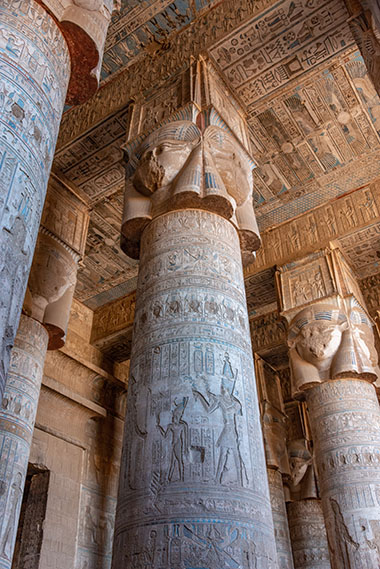 Photo by Diego F. Parra
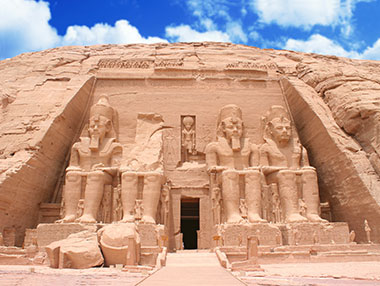 The Great Temple at Abu Simbel Photo by Lsantilli
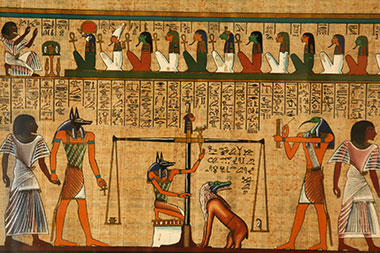 Ancient papyrus book of the dead By Frances Codemarco / Adobe Stock
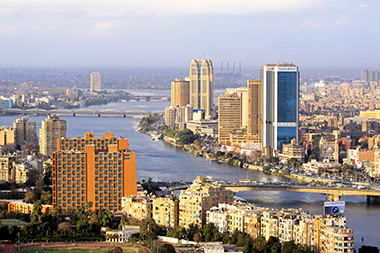 Cairo skyline and the Nile river Photo by Markobe / Adobe Stock
|
 Photo by Diego F. Parra
Photo by Diego F. Parra The Great Temple at Abu Simbel
The Great Temple at Abu Simbel Ancient papyrus book of the dead
Ancient papyrus book of the dead  Cairo skyline and the Nile river
Cairo skyline and the Nile river